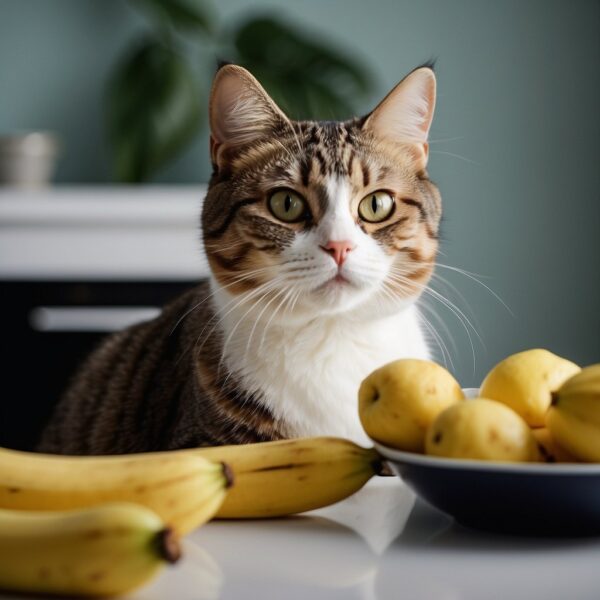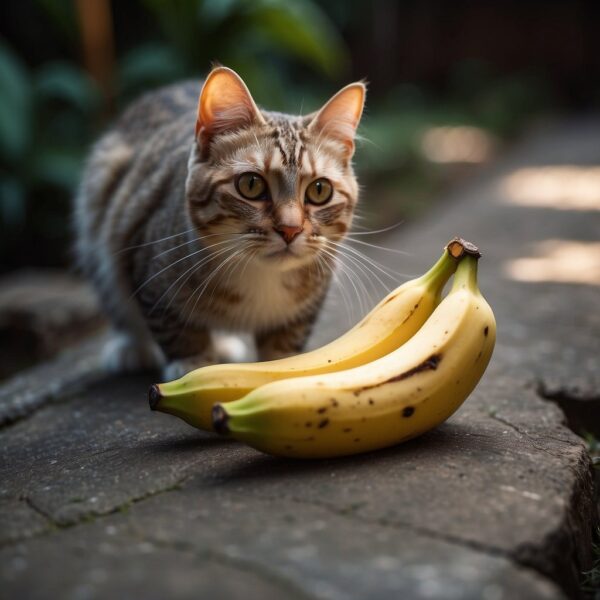
Can Cats Eat Bananas? Safe Snacking for Your Feline Friend
Bananas are a common staple in human diets, known for their rich source of potassium, vitamins, and carbohydrates, which lead many cat parents to ask if cats can eat bananas too! While bananas are non-toxic to cats, it’s important to understand how they fit into a cat’s diet. As obligate carnivores, cats require a diet that is predominantly made up of meat to fulfill their nutritional needs.
Introducing bananas—or any human food—should always be approached with caution. Even though the occasional small piece of banana is unlikely to harm a cat, they offer no real nutritional benefit for them. Moreover, some cats may experience digestive distress, as their digestive systems are not adapted to process high amounts of fruit sugars. Therefore, while a tiny amount of banana can be a safe treat, it’s essential to ensure it does not substitute the vital components of their regular diet.
Key Takeaways
- Bananas are non-toxic to cats but provide no significant nutritional value for them.
- Cats are obligate carnivores, and their diets should be meat-centric.
- Small banana portions can be safe, but they should not replace a cat’s regular diet.
NOTE: Please consult your veterinarian before introducing new foods to your cat, including human foods. What’s safe for one cat may not be suitable for yours, considering factors like age, health, and diet. Cats on prescription diets should not consume anything beyond their prescribed regimen.
Can Cats Eat Bananas Safely?
Cats can consume bananas in moderation since they are non-toxic, but several health concerns should be considered to maintain their safety and well-being.
Non-Toxic Nature of Bananas
Bananas are non-toxic to cats. They can be offered in small amounts as a treat. Cats, being obligate carnivores, derive their nutritional needs mainly from meat and do not require fruits in their diet. While bananas are not inherently harmful, they offer little nutritional value to felines.
Potential Health Concerns for cats eating bananas
Introducing bananas to a cat’s diet may lead to several issues:
- Digestive Sensitivity: Some cats may experience vomiting or diarrhea due to the fiber content in bananas.
- Blood Sugar Levels: Bananas contain high levels of sugar, potentially affecting cats with diabetes. Monitoring blood sugar levels is crucial for diabetic felines.
- Choking Hazard: The peel of a banana poses a choking hazard and is difficult for cats to digest.
- Obesity: Due to their starchy sugar content, excessive consumption of bananas can contribute to obesity in cats.
Moderation and close observation are key when feeding cats bananas to ensure their safety.
The Nature of Bananas
Bananas are widely considered a beneficial dietary component for humans due to their rich nutritional profile. In contrast, their suitability for feline diets is more complex and requires careful consideration.
Health Benefits of Bananas for Humans
Bananas are a healthful staple in many diets around the world. They offer a range of nutritional benefits including being a significant source of potassium, which is vital for heart function and blood pressure regulation. They also contain vitamin C, which serves as an antioxidant, and magnesium, which is important for muscle and nerve function. As a healthy snack, bananas provide a good amount of fiber, aiding in digestive health.
- Potassium: Essential for maintaining proper heart function and regulating blood pressure.
- Vitamin C: Acts as an antioxidant to protect the body against free radicals.
- Magnesium: Supports muscle and nerve function and is a crucial factor in hundreds of biochemical reactions within the body.
- Fiber: Promotes digestive health by helping to maintain regular bowel movements.
Why Fruits Can Be Problematic for Cats
While humans can derive nutritional benefits from fruits, such as bananas, cats often do not require these in their diets. Felines are obligate carnivores, which means that their natural dietary needs are largely met through the consumption of meat. Fruits, including bananas, citrus fruits, cherries, tomatoes, grapes, and raisins, can be problematic for cats due to several reasons, such as their sugar content and non-essential nature in a cat’s diet. Additionally, certain fruits like grapes and raisins are toxic to cats and should always be avoided.
- Fiber: While beneficial for humans, the fiber in bananas can cause digestive issues in cats if consumed in significant amounts.
- Sugars: The high sugar content in bananas and other fruits can lead to obesity and diabetes in felines when fed regularly.
Considering the dietary needs of cats, it’s clear that fruits do not play a critical role in their nutrition, and caution is advised when offering them as treats.

Feeding Your Cat Bananas
When considering bananas for cats, it’s important to balance the potential benefits with the need to maintain a diet appropriate for a carnivorous animal.
How to permit cats eating bananas
Bananas can be offered to cats in bite-sized pieces. To safely introduce bananas to a cat’s diet, they should be peeled and cut into small chunks to prevent choking hazards. Starting with a tiny amount allows the owner to monitor the cat’s reaction for any adverse effects, such as digestive upset or allergic reactions.
Determining The Right Portion Size
Due to their high sugar content and non-essential role in a cat’s diet, bananas should only make up a small fraction of a cat’s caloric intake. Treats, including bananas, should not exceed 10% of a cat’s daily caloric intake. A piece the size of a blueberry might suffice for a small treat. Feeding should be done with moderation, considering that cats derive their nutritional needs from proteins and fats, and may not process carbohydrates efficiently. Bananas should remain an occasional treat rather than a staple of their diet.
Understanding A Cat’s Diet
A cat’s diet is paramount for its health, centering on protein-rich foods due to their status as obligate carnivores with specific nutritional needs. The introduction of human food can pose risks, including toxic reactions and gastrointestinal issues.
Fundamentals of Feline Nutrition
Cats require a balanced diet that is high in protein to support their health. As obligate carnivores, they rely on meat to obtain essential nutrients such as taurine and arachidonic acid that cannot be adequately sourced from plant-based foods. A proper feline diet should provide a precise balance of the following:
- Protein: The cornerstone of a cat’s diet, vital for growth and maintenance.
- Fats: Supply energy and support cell structure.
- Vitamins and Minerals: Necessary for immune system function and metabolic processes.
- Water: Critical for hydration and bodily functions.
Risks of Feeding Cats Human Food
While some human foods can be safe in small quantities, there are inherent risks:
- Toxicity: Certain foods are toxic to cats, such as chocolate and onions.
- Allergic Reactions: Some cats might develop allergies to human foods, with symptoms ranging from mild to severe.
- Gastrointestinal Problems: Cats have a delicate digestive system, and irregular foods can lead to upset stomachs, diarrhea, or constipation.
- Health Conditions: Poor diet choices can exacerbate certain health conditions or contribute to obesity.
It is best to consult with a veterinarian to understand the specific dietary requirements and nutritional needs of an individual cat.
Suitable Alternatives to cats eating Bananas
While bananas are safe for cats in moderation, there are other treats that might be better suited for a cat’s nutritional needs. The following treats can provide a balance between enjoyment and health benefits for cats.
Safe and Healthy Cat Treats
Cat owners looking for suitable alternatives to bananas can consider a variety of animal products and specially formulated treats that cater to a feline’s carnivorous diet.
- Cooked Meat: Small pieces of cooked chicken or turkey without any added seasoning or sauces can be a healthy treat for cats.
- Commercial Cat Treats: Choose those high in protein and without added sugar or artificial flavors.
- Fish: Cooked salmon or tuna in small amounts can be appealing to cats and provide omega-3 fatty acids.
- Dehydrated Meats: These make for a convenient and safe treat, free of preservatives and fillers.
It is important to avoid sweet foods as cats do not benefit from them and they can lead to issues like obesity. Treats should be given sparingly, making up no more than 10% of a cat’s daily caloric intake. Always ensure fresh water is available when introducing new treats.
can cats eat bananas?: Frequently Asked Questions
When considering the dietary habits of cats, it’s crucial to know which foods are safe and which to avoid, as well as the potential benefits and risks associated with human foods.
What types of fruit are safe for my cat to consume?
Some fruits are safe for cats in small amounts, such as blueberries, sliced melons, and seedless watermelon. These should only be given as occasional treats.
Which human foods can I safely feed to my cat?
Cats can safely eat certain cooked meats like chicken or turkey, small portions of cheese, and cooked vegetables such as carrots or green beans. Always avoid adding seasonings.
What are some common foods cats should avoid?
Cats should never consume chocolate, caffeine, alcohol, onions, garlic, grapes, raisins, and foods containing the sweetener xylitol, as these can be highly toxic to them.
Are there any vegetables that are beneficial for cats?
Vegetables that can be beneficial to cats include cooked carrots, steamed asparagus, and baked squash. They should be served plain, without any added oils or seasonings.
How often can a cat eat bananas without health risks?
A cat can have bananas as an occasional treat, not exceeding 10% of their dietary intake. Frequent or large amounts are not recommended due to their high sugar content.
Can the ingestion of bananas help alleviate diarrhea in cats?
There is no evidence to suggest that bananas can help alleviate diarrhea in cats. In fact, bananas may cause gastrointestinal upset in some cats and should be offered cautiously.